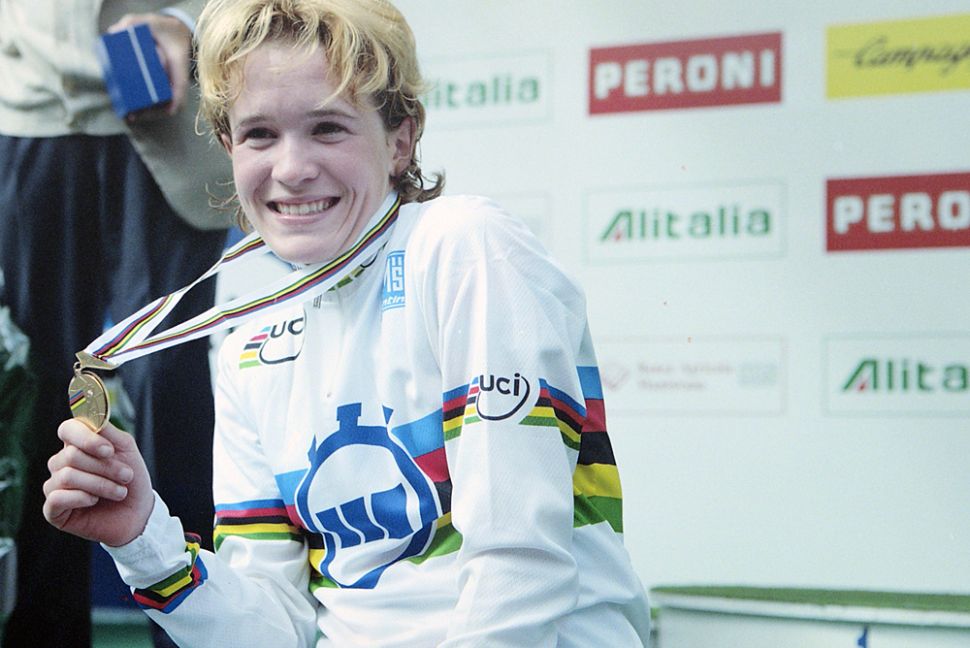Genevieve Jeanson encourages sport to target the system to eliminate doping
'You can't just target the athlete; it's also the coach, the team, the federation, the media, the sponsors' says Canadian

Genevieve Jeanson has offered her perspective on ways to eliminate doping in sport as part of a new documentary series, J’ai une question, that premiered on Crave TV last Wednesday.
Interviewed by NFL player Laurent Duvernay-Tardif, Jeanson said that athletes who test positive for performance-enhancing drugs only deserve part of the blame. She suggested sport instead needs to address and target the whole system that cultivates a “win-at-all-cost” environment.
"You can't just target the athlete; it's also the coach, the team, the federation, the media, the sponsors," said Jeanson in her conversation with Duvernay-Tardif, and as reported in the Montreal-based news outlet La Presse.
Jeanson confessed in 2007 to using erythropoietin (EPO) during most of her career, beginning as a teenager in 1998 and through her early 20s until 2005. She was subsequently issued a reduced 10-year ban for cooperating with an investigation conducted by the Canadian Centre for Ethics in Sport (CCES) into her allegedly abusive coach Andre Aubut and Montreal-based physician Maurice Duquette.
CCES handed Duquette a lifetime ban for the ‘administration of a prohibited substance to a minor’ and Aubut a lifetime ban for ‘administering a prohibited substance, erythropoietin (EPO), to Genevieve Jeanson during her cycling career’.
In her conversation with Duvernay-Tardif for the series J’ai une question, Jeanson reiterated the importance of better protecting youth athletes in sport.
“It was still the doping of a minor. We are kids! At 15-16 years old, we think we are very mature, but we are not at all!” Jeanson said.
Get The Leadout Newsletter
The latest race content, interviews, features, reviews and expert buying guides, direct to your inbox!
In an interview with Cyclingnews in 2015, Genevieve Jeanson - Exclusive Podcast and Genevieve Jeanson: New questions and answers, she detailed allegations of verbal and physical abuse as a teenager and an adult, as an athlete and in her personal life outside of sport.
(Aubut did not respond to Cyclingnews’ request for comment concerning Jeanson’s allegations of verbal and physical abuse during our reporting of this story in 2015. According to an Enquête interview published in 2007, Aubut refuted allegations that he pushed Jeanson into using EPO.)
When asked about those who have criticized her for staying in this situation for as long as she did, Jeanson said in the J’ai une question interview: "Why doesn't a woman who is beaten leave? Because it's not as simple as that.”
Jeanson has also spoken out against abuses in sport in an open letter that she penned to the International Cycling Union (UCI) following the highly-publicized case involving Health Mate-Cyclelive team manager Patrick Van Gansen.
Jeanson believed that Van Gansen was given an inappropriately light sentence given the severity of his offences toward multiple riders on his former team, and that the sport governing body needed to do more to protect its athletes.
Referencing her own experiences, Jeanson wrote, “As you may recall, I retired from professional cycling in 2006 following a failed EPO test. In my situation, the “omertà” surrounding the abuse I endured by my coach, and the ongoing EPO use were inextricably related.”

Kirsten Frattini is the Deputy Editor of Cyclingnews, overseeing the global racing content plan.
Kirsten has a background in Kinesiology and Health Science. She has been involved in cycling from the community and grassroots level to professional cycling's biggest races, reporting on the WorldTour, Spring Classics, Tours de France, World Championships and Olympic Games.
She began her sports journalism career with Cyclingnews as a North American Correspondent in 2006. In 2018, Kirsten became Women's Editor – overseeing the content strategy, race coverage and growth of women's professional cycling – before becoming Deputy Editor in 2023.